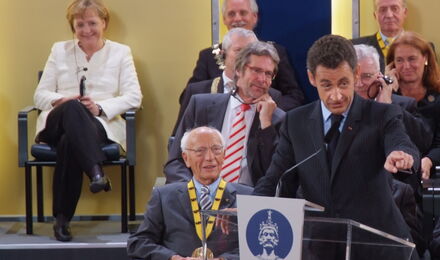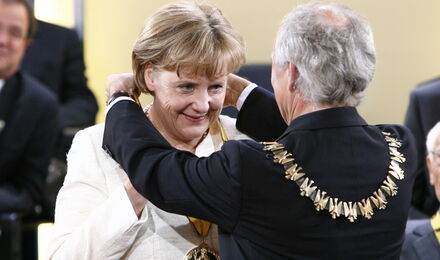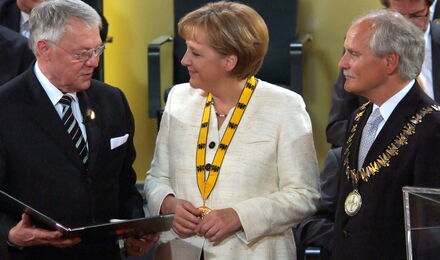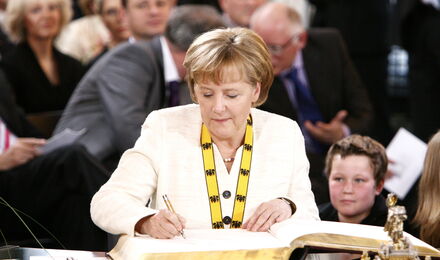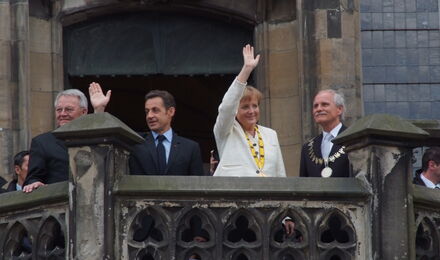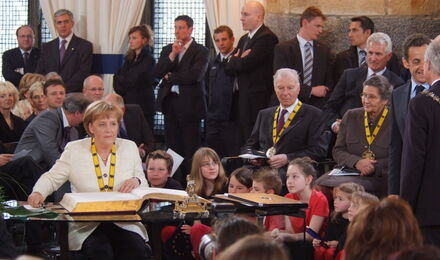The International Charlemagne Prize of Aachen is awarded to the Chancellor of the Federal Republic of Germany, Dr Angela Merkel
Europe has overcome the standstill, regained its ability to act and found new common strength!
Only last year, the historic project of the European Union was in a visible crisis. Fears of seemingly limitless expansion and a ‘superstate’ Europe, concerns about economic prosperity and social security, and scepticism towards the authorities in Brussels – all this was expressed in a lack of trust between the European institutions and the citizens.
Today, we are experiencing something new and positive. The ‘state of shock’ has been overcome. Important political issues have been decided and the dialogue between the population and the representatives of European politics has been re-established. The culture of dialogue among the member states has also changed: the partnership is back in the foreground, which has contributed significantly to solving difficult substantive issues.
The course set for a new departure for the Union is decisively linked to the energetic, judicious and inclusive policy of the German Chancellor Dr. Angela Merkel's EU Council Presidency. In appreciation of her outstanding contribution to overcoming the crisis of the EU and in recognition of the landmark decisions for the advancement of the European unification process, she is to receive the International Charlemagne Prize of Aachen in 2008. The Board of Directors of the Society for the Conferring of the International Charlemagne Prize of Aachen hereby honours a convinced European for her groundbreaking contribution to the European basic treaty, her integrative and humane, yet decisive and goal-oriented conduct of negotiations, for her clever diplomacy and her committed advocacy of deepening European integration.
‘I have spent my whole life in Europe. But in the European Union I am still a young person. I grew up in the former GDR... So until I turned 35 I only knew the European Union from the outside, and since 1990 I have known it from the inside... From the outside, the European Union is an unparalleled historical success story... But from the inside, the European Union is a wonderful house too. Seen from the inside, I find it even more beautiful... I never want to leave this house again.’ When Angela Merkel sought the support of the European Parliament in Strasbourg in January 2007, she deliberately recalled her personal biography with these words. The Chancellor was the first woman to take the chair of the European Council who had spent a large part of her life in a former Warsaw Pact state.
Angela Merkel was born in Hamburg on 17 July 1954. Just a few weeks later, her father, a Protestant pastor, took up a parish in Brandenburg, where she grew up and passed her school-leaving certificate in Templin in 1973. She went on to study physics at the University of Leipzig, graduating in 1978, and then worked at the Central Institute for Physical Chemistry at the East Berlin Academy of Sciences until 1990.
In the wake of the peaceful revolution, Merkel joined the ‘Democratic Awakening’ at the end of 1989, and she took over its public relations work only a short time later. After the Volkskammer election in March 1990 and the formation of a coalition government under Lothar de Maiziere, she became deputy government spokeswoman. In December 1990, she was elected to the German Bundestag for the first time, having meanwhile joined the CDU.
In January 1991, Helmut Kohl appointed the then 36-year-old to his cabinet as Minister for Women and Youth; a few months later, she was also promoted to deputy federal chairwoman of the CDU. When she took over the leadership of the Federal Ministry for the Environment, Nature Conservation and Nuclear Safety from Klaus Töpfer at the end of 1994, she was quickly able to make a name for herself, among other things as chair of the UN Climate Summit (March 1995) held in Berlin.
After the loss of government responsibility, Angela Merkel took over the office of Secretary General of the CDU in 1998. In April 2000, she was finally elected as the first woman in the party's history to become chairwoman of the CDU in Germany; two and a half years later, she also took over the chair of the joint CDU/CSU parliamentary group.
On 22 November 2005, she was elected as the first female Chancellor of the Federal Republic of Germany by the grand coalition formed by the CDU/CSU and SPD in the wake of the early parliamentary elections in September 2005. In her government declaration, she made the goal of German European policy unmistakably clear in the following years – regardless of the bitter setbacks that the project of Europe had suffered in the referendums in France and the Netherlands: ‘We want to make the Constitutional Treaty a success, even if that seems somewhat illusory today. A Europe with no sense of its own identity is not possible.’
Just a few days later, the Chancellor's constructive role as mediator at the EU summit in December 2005, which was able to agree on the community budget for 2007 to 2013 after tough negotiations, attracted a great deal of attention. Merkel was also instrumental in overcoming the partial standstill that the European project had reached. In the good tradition of previous German chancellors, she successfully positioned herself as a mediator and made it clear from the outset that Germany takes the interests of the small countries and the new member states from Central and Eastern Europe seriously and includes them without neglecting relations with Paris – where her first visit abroad had taken her as a kind of confirmation of the special German-French relationship – London, Rome or Madrid.
Expectations were therefore high for the German EU Council Presidency, which was followed by the presidencies of Portugal and Slovenia in a ‘trio presidency’ for the first time. In a joint declaration on 5 November 2006, the Cabinet made it clear what the Federal Government should focus on in addition to specific political progress: ‘Europe will only be able to flourish if its citizens identify with the great idea of European unification and with the historically unique European peace project. Only the people can give the European idea of unity in diversity its soul. The Federal Government wants to help create new trust in the European institutions and to strengthen the approval of the citizens for European integration again.’
Under the motto ‘Europe – succeeding together’, the German Council Presidency was indeed able to win over the citizens once more to the European project and to inspire them in the following months. The change in public opinion had already become widely apparent at the anniversary celebrations held in Berlin in March 2007 to mark the 50th anniversary of the Treaties of Rome, which turned into a unique European citizens' festival. At the end of the German Presidency, public approval of the EU was at its highest level in a decade.
The change in mood was also accompanied by clearly recognisable political progress. At the Council meeting on 8-9 March 2007, the Federal Chancellor was able to achieve results that would have seemed inconceivable just a few months earlier. Among other things, the heads of state and government of the EU member states agreed on the further development of the Lisbon Strategy, the massive reduction of administrative costs, the expansion of renewable energies and binding targets for climate protection – which Angela Merkel later successfully placed at the centre of the G8 summit in Heiligendamm. And so it was that the spring EU summit under the German presidency sent out a clear signal of the EU's ability to act and its firm commitment to further integration.
The goal of the German Council Presidency was to ‘adopt a road map for the further process of the Constitutional Treaty’. However, the results of the Council of 21-22 June went far beyond a road map for the treaty-making process. Rather, the agreement on a very precise mandate for an intergovernmental conference and the broad outlines of a new reform treaty also marked a breakthrough in terms of content, with the designation ‘constitution’ rejected, but essential contents of the draft largely preserved. The key agreements include, among other things, the extension of the co-decision procedure, the reform of the composition of the Commission, the election of the President of the European Council, the strengthening of the Common Foreign and Security Policy, the legally binding nature of the Charter of Fundamental Rights, the introduction of the ‘double majority’ and the greater involvement of national parliaments and EU citizens.
The decisions, which were largely influenced and shaped by Angela Merkel, have cleared the way for a more democratic, efficient and effective Europe. The reform treaty should enable the EU to successfully address current challenges such as climate change and energy security, strengthening competitiveness and the social dimension of the EU, combating international terrorism and organised crime, as well as questions of immigration and possible future enlargements. And it should give the Union the ability to vigorously fulfil its international responsibilities – in the interests of its citizens and on the basis of Europe's fundamental values: respect for human dignity, freedom, democracy and the rule of law.
In the Chancellor of the Federal Republic of Germany, Dr Angela Merkel, the Board of Directors of the Society for the Conferring of the International Charlemagne Prize of Aachen honours a great European who, with courage and energy, determination and negotiating skill, has made an outstanding contribution to the progress of integration and to overcoming the crisis of the EU.





